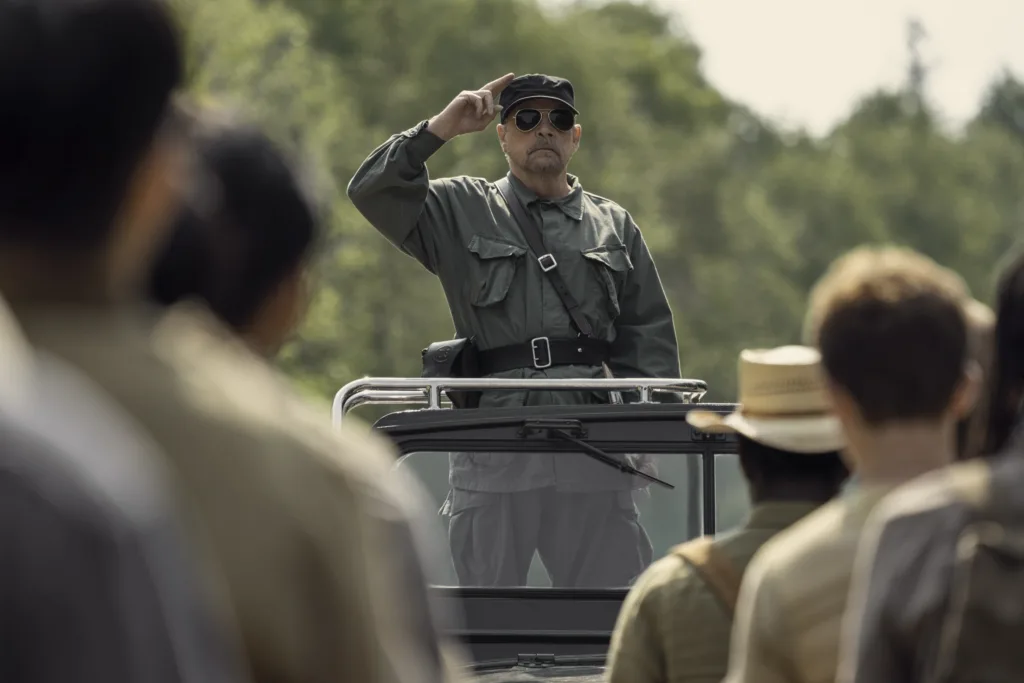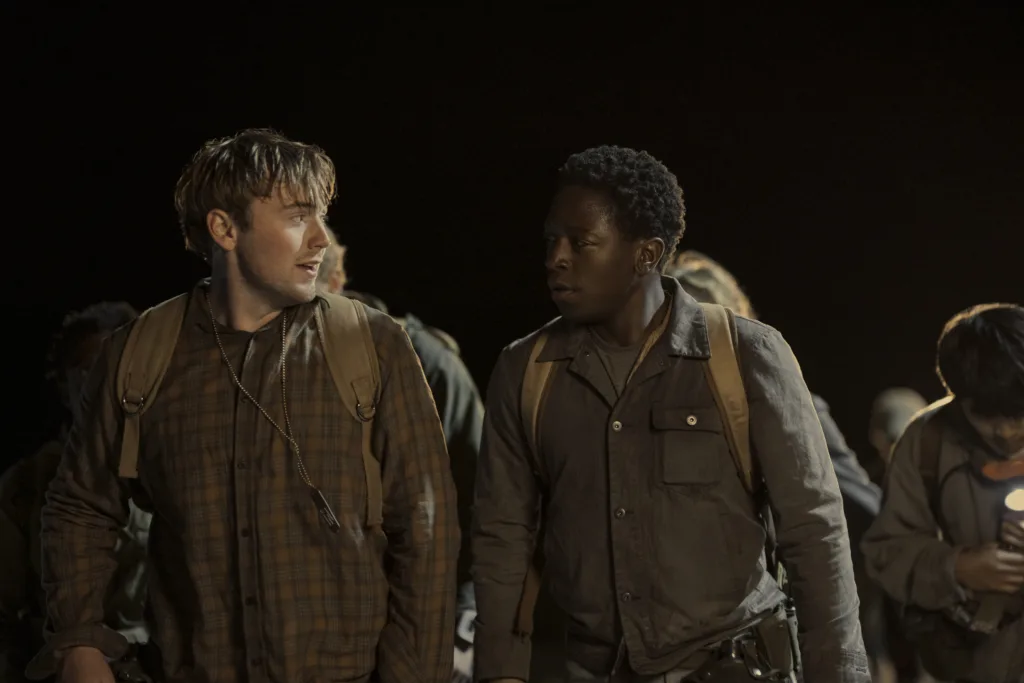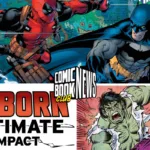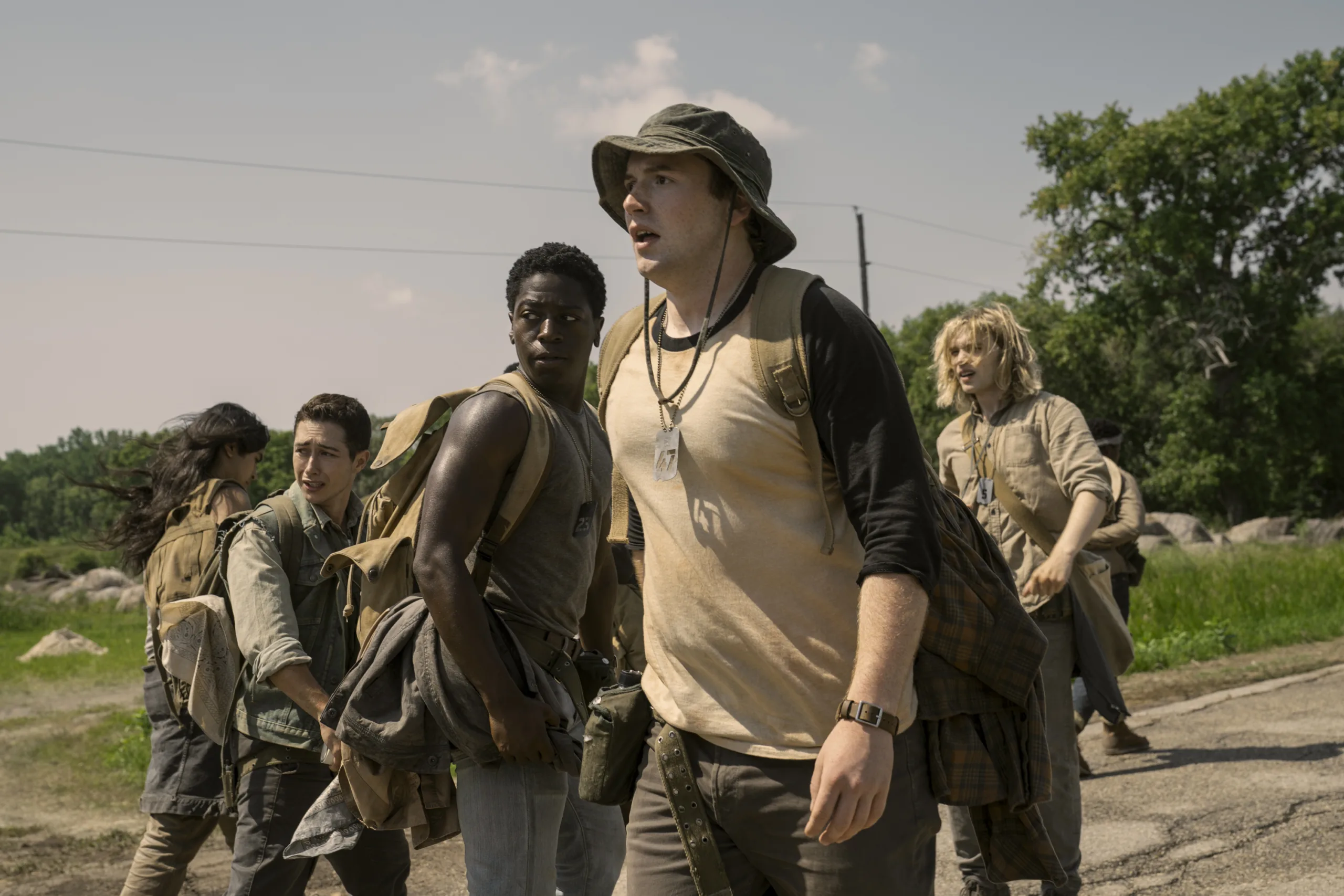Back in 1979, Stephen King, under the guise of his pen name Richard Bachman, published The Long Walk. A Vietnam War allegory, like most of “Bachman’s” books, it likely would have eluded notice if King hadn’t been outed as Bachman in 1985. But he was, and it was, and forty years after that, the book has been adapted for the screen by writer JT Mollner and director Francis Lawrence. It’s been a — pardon the pun — long walk to get into theaters, but now that it has arrived, the story King crafted all those decades ago feels more pressing and timely than ever.
Taking place an indeterminate year in the future, the titular contest is the classic teen death game seen in Battle Royale, or more to the point, The Hunger Games… Lawrence has directed every cinematic iteration of that franchise since Catching Fire. But unlike the bombast of Panem, the Long Walk of the title is empty and bleak, taking place in an America that might as well be as dead as the teens walking the road will soon be. The taut tale, which is presented in the film over an unrelenting 108 minutes (including credits), follows 50 boys as they walk the empty roads of America in a contest to win unimaginable riches, and one “wish.” The wish past isn’t magical or fantastical, a la some of King’s other tales, but instead an extra little something that proves to be at first a fun “what if” for the teens as they walk, and later a most pressing plot point.
Why walk at all? Every character has their own reasons, but the overall goal, according to the gruff Major (Mark Hamill), is that the televised contest increases the GDP of America every year after it’s “played.” With enough Long Walks, the Major barks at them, and they can bring America back to its former glory. It’s never said aloud, but the implication is clear: they can make America great again. And on that, it’s a pretty pointed casting to have noted online Trump critic Hamill in the villain role. He doesn’t play the current President beat for beat, but the rhetoric coming from Mollner’s script through the mouthpiece of the Major clearly echoes the idea that America’s best days are ahead of it — despite all visual evidence to the contrary.

Oh, and sorry, forgot to mention: only one of the kids makes it out alive to win. The goal of the contest is simple: to walk above three miles per hour (changed from four miles per hour in the book). Drop below the speed limit one time, and you get a warning. The second time and you get a second warning. You can eliminate a warning by staying at speed for over an hour, and get back down to zero. But if you hit that third warning, you’re out. And “out” means you’re shot in the head by one of the near-silent soldiers following the walkers throughout the contest.
With his Hunger Games pedigree, Lawrence seems like he should bring a “been there, done that” sense to the movie. But The Long Walk is a revelation, a nastier, more nihilistic cousin to Hunger Games that strips the bombast, color, and action movie pedigree from that series and brings it down to basics. Nearly every on-screen death is shown through a steady, locked-off camera, bloody and brutal: we’re forced to watch. And none of the deaths are fun or triumphant. The kids walk, they die. That’s it.
There’s also none of the spectacle of the Hunger Games present here, as, with few exceptions, the action is firmly locked on the contestants as they walk. Lawrence keeps us with them, usually filmed in close-ups and medium shots, putting the performances front and center.
And the performances are spectacular. Cooper Hoffman, the son of the late Phillip Seymour Hoffman, stars as Ray Garraty, who is competing for his home state and leaving his terrified mother (played by Judy Greer) behind. He has very personal reasons for competing in The Long Walk, and while Hoffman has always been good in his other film roles, here, based on plot alone, it seems he’s dealing with the untimely passing of his own father. It’s a raw, personal performance that follows Garraty as he, like the rest of the contestants, starts to physically and mentally fall apart the longer the Walk continues.

Keeping him going, and the star-making turn in the movie, is David Jonnson as Peter McVries. Jonnson has always been fantastic, from his stand-out turn as the synth Andy in Alien: Romulus, the romantic lead in the underrated Rye Lane, or his thankless role on HBO’s Industry. But here, Jonnson shines as the cheerleader of the group and instant best friend of Ray. What Jonnson does is complicated because McVries is keeping the energy of the group up, but you can see his own energy flagging at times, peeking through while he’s cheering up the gang. It’s always hard to say what a breakthrough role will be based on the whims of the entertainment industry, but Jonnson is a stand-out here that could easily throw him into dark horse Oscar contention.
The rest of the cast acquits themselves ably as well, though some roles boil down to “kid in glasses” or “silent, strong dude.” Garrett Wareing as Stebbins and Charlie Plummer as Gary Barkovitch stand out as a clipped off soldier type and an unhinged weirdo, respectively, both semi-antagonists to our main characters. And Ben Wang, recently the new Karate Kid, falls weirdly into the “Data in Goonies” role, but part of that is, like the rest, watching him sadly fall apart as things go.
But the focus of the film isn’t good guys and bad guys, necessarily, except for the broad, sometimes distracting portrayal of The Major — the movie’s one weak point. It’s more about the conversation between these kids, and watching them go from hopeful to beaten down sludge and/or dead. The broader theme mentioned above that Lawrence and Mollner are dealing with still works as referencing the Vietnam War: teen boys entering a lottery to “fight” for America, ending up dead for seemingly no reason in a battle that never ends. But it’s clear that The Long Walk is as much about the 1970s as it is about today. It’s hard not to see a totalitarian military government watching poor people die for them in an America that’s already fallen from grace and think about where we are in the US, in 2025.
Lawrence says as much in a note about the film sent to critics, stating, “My goal with this film is to honor what makes King’s novel such a powerful experience: the unforgettable characters, the relentless pace, and the uncomfortable questions it asks about who we are and what we value. I want audiences to leave the theater thinking not just about what they’ve seen, but about the world they’re part of.”
While we may not have a Long Walk in the United States right now, and it certainly felt like a faraway fantasy back in the 1970s, it’s the sort of thing that now feels only one or two steps off. The Long Walk was a criticism of what was happening in the US when King first wrote it. Now, thanks to Lawrence and Mollner’s movie, it’s a pressing, harrowing alarm bell. Here’s hoping we veer off and start walking in the right direction.
The Long Walk hits theaters on September 12, 2025.
Comic Book Club Live Info:
Discover more from Comic Book Club
Subscribe to get the latest posts sent to your email.











